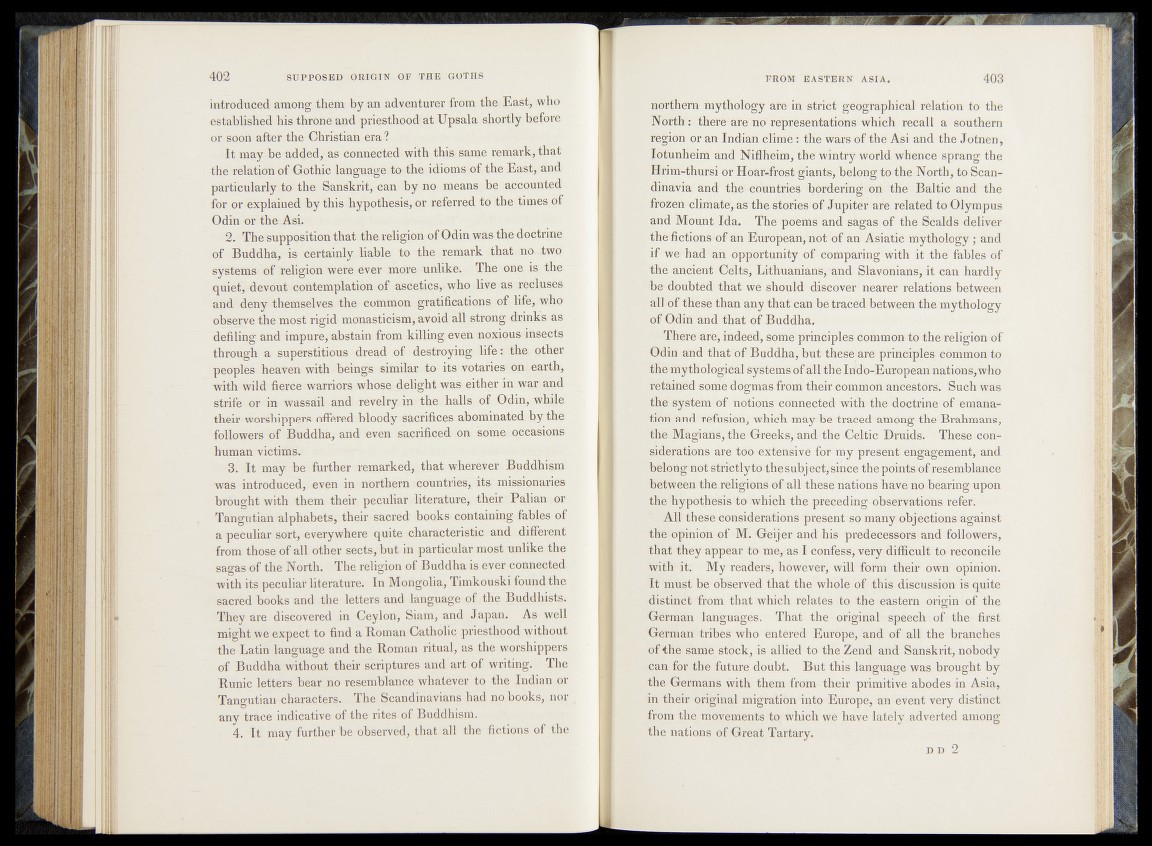
introduced among them by an adventurer from the: East, who
established his throne anil priesthood at Upsala shortly before
or soon after the Christian era
It may be added, as connected with this same remark, that
the relation of Gothic language to the idioms of the East, and
particularly to the Sanskrit, can by no means be accounted
for or explained by this hypothesis, or referred to the times of
Odin or the Asi.
2. The supposition that the religion of Odin was the doctrine
of Buddha, is certainly liable to the remark that no-.lwo
systems of "religion were ever more unlike. The one is the
quiet, devout contemplation of ascetics,* who live as: recluses
and deny themselves the common gratifications of life, who
observe the most rigid monasticism, avoid all strong drinks as
defiling and impure, abstain from killing even noxious-insects
through a superstitious dread of destroying life: the. other
peoples heaven with beings similar to its votaries, on, earth,
with wild fierce warriors whose delight was either in war and
strife or in wassail and revelry in the halls,<o£ Odin, while
their worshippers offered bloody sacrifices abominated by the
followers of Buddha, and even sacrificed on some occasions1
human victims.
3. It may be further remarked, that wherever Buddhism
was introduced, even in northern countries, its missionaries
brought with them their peculiar literature, their Palian .or
Tangutian alphabets, their sacred books containing fables of
a peculiar sort, everywhere quite characteristic and . different
from those of all other sects, b u t in particular most unlike the
sagas of the North. The religion of Buddha is ever connected
with its peculiar literature. In Mongolia, Timkouski found the
sacred books and the letters and language o f; the Buddhists.
They are discovered in Ceylon, Siam, and Japan. As well
might we expect to find a Homan Catholic priesthood without
the Latin language and the Roman ritual, as the worshippers
of Buddha without their scriptures and art of writing. The
Runic letters bear no resemblance whatever to the Indian or
Tangutian characters. The Scandinavians had no books, nor
any trace indicative of the rites of Buddhism.
4. I t may further be observed, that all the fictions of the
northern mythology are in strict geographical relation to the
North : there-are no representations which recall a southern
region or an Indian clime: the wars of the Asi and the Jotnen,
Iotunheim and Niflheim, the wintry World whence sprang the
Hrim-thursibr Hoar-frost giants, belong to the North, to Scandinavia
and the^cdtfn tries- bordering on the Baltic and* the
frozen climate, as thd stories of Jupiter are related to Olympus
and Mount Ida. The poems and sagas of the Scalds deliver
the fictions of an European, not of an A^iatie mythology ; and
; if we had an opportunity of comparing with it the fables of
the ancient'Cdlts, Lithuanians,'and (Slavonians, it can hardly
her doubted that we shodtek-discover ‘ nearer relations between
a ll’bf these-than any that|Can be traced1 between the mythology
of Odin and that-of Buddha.
There are, indeed, some principles?gammon to the religion of
Odhrand that of Buddha, but'these» are principles common to
the mythological systems of all the Indo-European nations, who
retained from their common ancestors'. Such was
the* System of< notions*'Connected with the *doctrinotoffemana-
tidnXUnd refusion, which may-be traced among:the Brahmans,
thb?Magians, the Gredkspand thettSeltic Druids. These ebral*
si'dera-tionsPare too extenSi-vq for- my presMiStt engagement, ■ and
belong not strictlyto the subject,(.sinee:,the^o'M'feofresemblance
hetype'en the_religions of all these nations have) nobdaring upon
'the"hypothesis to which the preceding observatiofts refer.
All? these considerations present so many objections against
the opinion of M. Geijer and his predecessors sand followers,
that they appear to me/as I confess, very difficult to reconcile -
with 'it. My readers, however, will form their own opinion.:
It must be observed that the wholerof. this' discussion is quite
distinct from that which' relates to the 'eastern origin of the
German languages. That ;the ^original speech off the first
German tribes who entered Europe, and © f^p the braihlhes
of the same stock, is allied to the Zend and Sanskrit, nobody
can for the future doubt. But this language was brought by
the Germans with them from their primitive» abodes in Asia,
in their original migration into Europe, an' event very distinct
from the movements to, which we have lately adverted among
the nations of Great Tartary.
D D 2